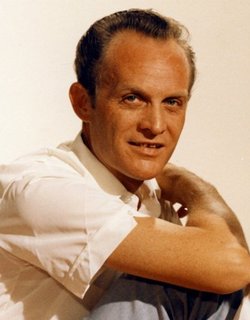Ira Louvin (Ira Lonnie Loudermilk)

Ira Louvin
Ira Louvin was born in Section, Alabama and played together with his brother, Charlie, in the close harmony tradition as the Louvin Brothers. They were heavily influenced by the Delmore Brothers and Monroe Brothers. Ira played mandolin with Charlie Monroe, guitar player of the Monroe Brothers in the early 1940s. The Louvin Brothers’ songs were heavily influenced by their Baptist faith and warned against sin.
The shows were at Genova’s Chestnut Inn in Kansas City, Missouri. In his autobiography Whisperin’ Bill, Bill Anderson described the Chestnut Inn as an interesting combination of music nightclub where country (and rock — Chuck Berry played there) performers entertained the crowd, while strippers performed between sets.Following the shows, Ira, wife Anne, and another couple who were friends of Ira’s from the Fort Payne area left Kansas City to return to Alabama. They stopped at an all-night diner at about 3:00 a.m. on Father’s Day, Sunday, June 20, 1965, for some food, then continued on their way.Interstate 70 was under construction at the time, with traffic reduced to one lane in each direction. The car Louvin was a passenger in (his friend from Fort Payne, Billy Barksdale, was driving) was heading east on the dark road, reportedly at a high rate of speed. At approximately 4:40 a.m. a pick-up truck driven by 53-year-old Tommy Franklin of St. Louis smashed head-on into the Louvin car. Numerous opened liquor bottles and cans were found in Franklin’s truck, and the accident was ruled caused by drunk driving.
The results were horrific. Four of the six occupants — Franklin and his passenger, and Barksdale and his wife — were killed instantly from the impact. The Louvins, in the back seat, were severely injured. By the time police arrived at the lonely stretch of interstate, Louvin had bled to death. Anne was still alive, but by the time she was transported to a hospital then sent to another one because the first hospital lacked the facilities to treat her, she too had passed away. Ira was 41; Anne was 38.
Charlie Louvin was on tour, performing in West Virginia. His wife, Betty, was home in Nashville. She was contacted while in church and asked to notify her husband that her brother-in-law was dead. Charlie performed his show as scheduled in West Virginia, then went back to Nashville to plan his brother’s funeral.
On Wednesday, June 23, 1965, Ira and Anne Louvin were laid to rest in a common grave in the Harpeth Hills Memory Garden cemetery in suburban Nashville. Bill Anderson, who wrote the last hit of the Louvin Brothers’ career (“Must You Throw Dirt in My Face”), wrote the epitaph on Ira’s marker:
His fame was not a vapor that vanished with the dawn, for he etched upon the hearts of all mankind words and melodies that will remain as eternal as the God with Whom he now rests.
Born
- April, 21, 1924
- Alabama
Died
- June, 20, 1965
- Williamsburg, Missouri
Cause of Death
- Auto accident
Cemetery
- Harpeth Hills Garden
- Nashville, Tennessee


